Protecting your online privacy, reducing clutter on websites, and avoiding ads that may contain spyware can be achieved by using ad blockers. Our experience has shown that you don’t need to pay for ad-blocking software when excellent free options are available on the market. This guide presents a selection of effective and free ad blockers that work well with popular browsers like Chrome and Firefox, ensuring a smooth online experience.
The best free ad blockers
From our research, the best free ad blockers are:
- AdLock: The best free ad blocker. An excellent free ad blocker that works well across all devices, including mobile
- AdGuard: Excellent ad blocker, but no longer always free as some features require an upgrade.
- Surfshark: The CleanWeb feature effectively blocks various ads, shields against trackers, and offers excellent value with additional security and privacy tools.
- Total AdBlock: Offers a free trial for ad-blocking via Chrome extension, iOS, or Android, and includes a complete antivirus tool as a bonus.
- Adblocker Ultimate: A great all-round ad blocker with a browser extension
- Stands Fair Adblocker: Ethically-centered ad blocker with favorable whitelisting features
- AdBlock Plus: Carries a useful element-blocking feature to extend its usefulness
- Poper Blocker: Provides a distinct focus on removing overlay ads
- Trustnav Adblocker: Blocks most ads and is excellent when combined with its antivirus tool
- NoScript: Technical-level ad blocking for Firefox users (and only Firefox)
- Opera Browser – One of the best built-in ad blockers of any browser
Ad blockers are the obvious solution to removing unwanted ads on the web. Paid ad blockers are typically the best option if you want something that works the best, but many free ad blockers might just get the job done for you.
Below, you’ll find our detailed overview of the best free ad blockers available. No ad blocker is perfect, however, so you may need to try out multiple options to find the right fit.
Note: If all you’re looking to do is get rid of annoying pop-up advertisements, check out our guide on the best popup ad blockers.
Best Ad Blockers- Browser plugins and apps
Your best ad blocking option is to install a browser plugin or utilize a web browser that already has a built-in blocker. Browser plugins or built-in ad blockers can interact with the websites you’re using much more accurately than a standalone program operating on your computer in the background.
1. AdLock
Far from being just a browser plugin, AdLock also offers Windows and Android ad-blocking tools that help block ads across your apps. Its feature set is long, especially for a free adblocker, which helps make it one of the better options on our list for wide-ranging usefulness beyond just blocking ads.
AdLock is designed to get rid of all forms of ads, and with but one exception, cleared away all of the ads that we tested across a variety of sites. This service blocked every ad on the various websites that we tested for this article, including ads on YouTube and other ad-supported streaming sites.
By default, the tool is designed to block every possible type of ad you might encounter. You can easily whitelist a site by clicking on “Settings” and then “Whitelist”. You’ll also be able to toggle a few additional filter settings in there if you so choose. Chances are, though, that you’ll likely want to leave those alone.
Pros:
- Blocks all types of advertisements
- Removes ads on videos
- Numerous add-on features, including warning against spam and scam links
- Can block ads across all apps and browsers through Windows app
Cons:
- Some of its best features are locked behind a paywall
- Only blocks all ad types through the paid version
Score: 6/7
Works with: Chrome, Safari, iOS, macOS, Windows, Android
2. AdGuard
This tool has made one major improvement since we first wrote our list: It’s now competely free. Where AdGuard once tried to charge for this product, it now provides it for free. Instead, it now has other products it’s trying to sell, including a VPN.
AdGuard does exactly what you want it to do. You can block all of the types of advertisements that we tested, which is positive. It also carries a wide range of adjustable features that make it exceptionally useful for privacy and security, such as anti-phishing, anti-malware, and a cookie destroyer that deletes third-party cookies after an amount of time that you can independently set.
Since we first tested this product, it’s also been improved on what ads it will block. A retest shows that it blocks all types of ads, including on websites with ads that are often difficult to block.
Pros:
- Now free forever
- A long list of interesting features, including anti-phishing and a cookie deleting tool
- Prevents tracking cookies
- Blocks Youtube and other video ads
Cons:
- Charges for mutli-platform support
Score: 6/7
Works with: Chrome, Firefox, Safari, Opera, Microsoft Edge, Yandex.Browser, Windows, macOS, iOS, Android
3. Surfshark
Surfshark is best known as a top-rated VPN, but it also offers a potent ad-blocking tool called CleanWeb. This feature effectively blocks a variety of advertisements, including pop-ups, banners, and video ads. Its ability to bypass ad-blocking detection on some websites is another valuable asset.
Additionally, CleanWeb helps to protect your privacy by shielding you from trackers and potentially malicious ads. While Surfshark isn’t strictly a free service, it provides exceptional value with its comprehensive security and privacy features extending beyond ad-blocking.
Pros:
- Blocks a wide range of intrusive ads
- Effective against anti-adblocker measures
- Includes a suite of other privacy and security features within a full VPN service
- Offers great value for the price
Cons:
- Not a completely free solution
Score: 6.5/7
Works with: Chrome, Firefox, Microsoft Edge, Android, iOS, macOS, Windows
4. Total Adblock
Total Adblock is a top choice for users seeking a comprehensive ad-blocking solution. While it’s the only paid option on our list, it justifies its price with a potent ad-blocking capability that surpasses most free alternatives. Users can initially take advantage of a significant introductory discount, making it an attractive proposition right from the start.
Total Adblock shines in its versatility and effectiveness. It proficiently filters out various advertising annoyances across different web platforms, from intrusive pop-ups to the often frustrating auto-play ads. The tool is particularly adept at enhancing the viewing experience on video streaming sites. Not only does it block ads on popular platforms like YouTube, but it also extends its capabilities to other ad-supported services such as Crunchyroll and Tubi. It bypasses even the more persistent ads, including Tubi’s age confirmation pop-up, offering a seamless viewing experience.
What sets Total Adblock apart from others is not just its ad-blocking prowess but also the value-added features it brings. Bundled with a lifetime subscription to TotalAV’s award-winning product and its PC Tune-Up software, it presents a comprehensive package that extends beyond mere ad blocking. This combination of advanced ad-blocking functionality and additional utilities makes Total Adblock a worthwhile investment for those seeking an uncluttered, uninterrupted, and secure online experience.
You can read our full TotalAV review here.
Get TotalAV free with TotalAdblock
Pros:
- Effective blocking of most annoying online ads
- Easy whitelisting and a quiet mode
- Completely blocks ads on YouTube and other video streaming sites
- Works on multiple web browsers and iOS devices (Android coming in the future)
Cons:
- Not a free option
Score: 6/7
Works with: most major web browsers, including Chrome, Edge, and Safari, as well as iOS devices.
5. Adblocker Ultimate
Another open-source project, AdBlocker Ultimate is good at removing most ads you might come across. In testing, it was able to dispel ads on YouTube and most display ads on various sites we tested. This ad blocker is also widely used and highly rated. It has 4.8 out of 5 from Google Chrome users, and over 800,000 installs.
When we first tested this product, it struggled with a few ad types. Since then, and after a retest of all the tools on this list, we’re inclined to give this one a perfect score thanks to how vastly it’s improved its blocking capabilities.
Pros:
- Exceptional ad blocking across all types of ads
- Free for all time
- Windows app available for ad blocking across all apps
- Tool for blocking individual website elements
- Extensive support for a large number of web browsers
Cons:
- None. This is the single best tool on the market
Score: 7/7
Works with: Chrome, Microsoft Edge, Firefox, Opera, Windows, Android, iOS
6. Stands Fair AdBlocker
This Chrome-only ad blocker is a low-impact plugin that does exactly what it’s intended to do. You can block all types of ads using this plugin, with the most obvious limitation being that it’s only available as a Chrome addon. The Stands Fair AdBlocker is not designed for wholesale ad blocking, although you can use it for that. The company believes in fair advertising and encourages users to whitelist certain ads from different sites.
Thankfully, Stands lives up to its promise of blocking ads. That included the more aggressive advertisements found on Orlando Sentinel, as well as other display ads, autoplay video ads, and ads on YouTube.
Pros:
- Highly flexible blocking settings
- Blocks all types of online advertisements
- Completely and always free to use
- Effective whitelisting features
Cons:
- Only works on Chrome
Score: 7/7
Works with: Chrome
7. Adblock Plus
With over 10 million downloads on the Chrome browser alone, Adblock Plus is the most popular ad blocking software around. A free and open-source project from the eye/o, Adblock Plus is the primary source code for many other free ad blockers available to download. 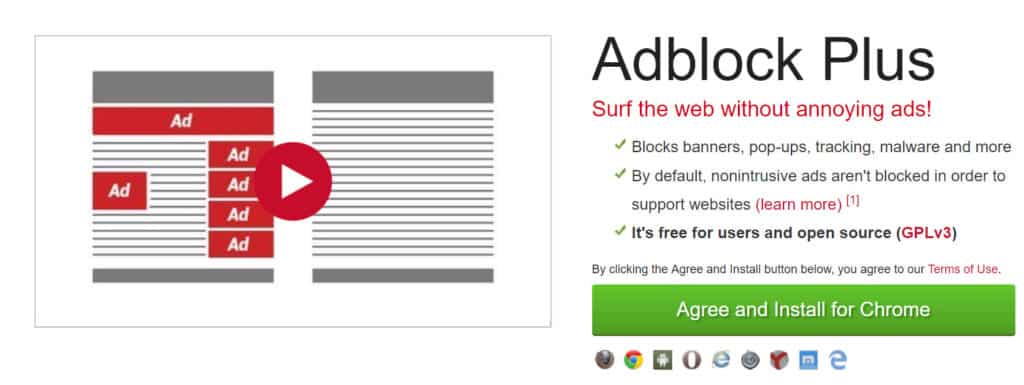
By default, Adblock Plus is not designed to block all ads, only those deemed intrusive or potential malware. The service has a nicely detailed explanation of why it has an Acceptable Ads policy and why this feature is turned on by default. That doesn’t mean you’re stuck with those ads. If you want to turn off the acceptable ads, you can easily do so in the settings.
It blocked most of the ads we found but was among the many ad blockers that couldn’t seem to deal with all of the ads on Orlando Sentinel’s website. That being the case, ABP is exceptionally good, but not a perfect solution.
Pros:
- Completely free for all features
- Provides a “block element” feature for ads that are not automatically blocked
- Offers language settings
- Allows you to build custom lists or upload pre-built block lists from third parties
Cons:
- Does not work on all types of ads, even with the Acceptable Ads feature turned off
Score: 6/7
Works with: Chrome, Firefox, Microsoft Edge, Internet Explorer, Opera, Safari, Yandex Browser, iOS, Android
8. Poper Blocker
This plugin has been hailed as the best pop-up blocker on the market by several other tech sites, which is a fair claim, although not necessarily the case from our testing. Poper Blocker works well, and we can certainly recommend it for most ad-blocking. However, it does leave many ads that the top free ad blockers on our list completely block every time.
Both the Chrome and Firefox versions of this plugin work well to block not just pop-ups but website overlays that are exceedingly common as well. For example, this tool blocks the ad-blocking overlay used by Orlando Sentinel, as well as the age verification overlay used by Tubi. If it fails to block an overlay, you can right-click the overlay to remove it. And, as with other blockers, whitelisting is available, as is the option to report when a pop-up fails to get blocked by the plugin.
Poper Blocker hits most of the criteria we look for in a blocker. It’s completely free to use and doesn’t lock any of its features behind a paywall. There’s no sign-up required, so you don’t have to give over personal information to use it, either. The only thing you may be concerned about is the fact that Poper Blocker collects and uses data anonymized — but you can opt-out of data collection services for even more privacy.
Pros:
- Completely free to use at all times
- Advanced overlay blocking features
- Separate tool for blocking ads that don’t get removed automatically
Cons:
- Fails to block ads on videos
- Does not block every type of pop-up ad
- Limited features
Score: 6/7
Works with: Chrome and Firefox
9. Trustnav Adblocker
Trustnav is an antivirus company developed in Andorra that provides a combination adblocker and antivirus Google Chrome plugin. The antivirus solution, which is premium and costs $1.99 per month, is currently unavailable. For now, you can use the solo adblocker plugin for free.
Trustnav also currently has a “Safesearch” Chrome plugin that’s separate from the adblocker. Be sure to install the adblocker version directly from the Chrome Store.
As far as functionality goes, Trustnav presents a very easy-to-use adblocker with a slim user interface. It’s simple and effective at most things. However, the biggest problem you’ll find with this adblocker is that you can’t adjust many settings. Trustnav lets you toggle whether the adblocker is on or off, whether it is blocking all ads or just some ads, and whether you want to get alerts. Beyond that, there’s no fine-tuning, no real whitelisting, and no way to view all of your adblocking stats outside of how many ads were blocked on the site you’re visiting at the time.
Additionally, we’ve found that this ad blocker is terrible at removing ads on videos. In fact, some video streaming websites even detect its use and disallow you to stream videos if it’s turned on. That’s a big failing for an ad blocker that claims to block ads on videos.
Pros:
- Beautifully simple interface
- Always free
- Blocks most static webpage ads
Cons:
- Fails to block video ads
- Gets detected by anti-adblocking filters
Score: 5/7
Works with: Chrome
10. NoScript Security Suite
This Firefox-only ad blocker is not so much an ad blocker, but a script blocker. NoScript prevents all types of scripts from loading on your web pages: Javascript, Java, Flash, and a number of other plugins. You can allow certain types of scripts, but the service takes a bit of a heavy hand by default.
The result is that you’ll block most display ads you come across. This included the aggressive blocking of most webpage advertisements, even the more pernicious types that other ad blockers struggled to stop. However, the biggest limitation of this tool is that it does not block most video ads, and it fails to block many overlay ads. It’s also a more technical tool than most other ad blockers and requires a broader technical knowledge of browser architecture, making it not ideal for average users.
Pros:
- An exceptionally granular-level approach to ad blocking
- Includes features to block other digital threats, such as tracking cookies and cross-site scripting requests
Cons:
- Only works on Firefox
- Fails to block several types of ads, including video ads
- Not user-friendly for most people
Score: 5.5/7
Best feature: Complete script blocking
Works with: Firefox
11. Opera Browser
If you’re looking for an all-inclusive ad blocking experience without the hassle of plugins, the Opera browser is an excellent source. Opera is one of the fastest and most well-built browsers around and was among the first web browsers to have a built-in ad blocker.
Opera’s ad blocker also works well. After turning it on in the settings, you’ll find it blocks almost every ad you come across. The only exception I found was that it failed to block the interstitial ads common on Forbes (the quote ad that often pops up before reading an article). Most of the other ad blockers we tested did block that ad from Forbes. That said, Opera blocks every other ad type that we tested, including those on Orlando Sentinel.
Pros:
- Built-in ad blocking functionality
- Easy whitelisting
- Blocks all types of advertisements
- Completely free forever
Cons:
- Only available on Opera browser (because it is a browser)
As good as it is, and despite the score, we listed this one lower on our list because it’s a limited option. As this is a web browser and not a separate tool that can be used as an extension, it’s ultimately less useful than the other options listed.
Score: 7/7
Works with: Opera
Why are Privacy Badger and Ghostery missing?
You may have heard of the popular ad blockers Privacy Badger and Ghostery. While we like and respect these two ad blockers, neither met our criteria based on how they function. Neither of these plugins is designed to block ads, specifically, but to deny website ads and other website elements that betray user privacy. As a result, both will block some ads some of the time but are primarily focused on privacy instead of complete security online.
That means you won’t get the kind of ad-blocking you might want from either of these plugins. Additionally, they don’t allow you much control over the type of ads they block, given their desire is to allow good ads to pass through and not block all ads wholesale.
Google Chrome Ad Blocker
Despite its bit of scaremongering, Google’s built-in ad blocker does not seem to do much. After putting it through the same tests as the other ad blockers listed above, it allowed every ad through that we could find. The built-in ad blocker is also very limited. Even finding a website where ads were blocked was difficult. And since the Chrome ad blocker is designed to only block certain types of ads, most ads you’ll find are not blocked, especially if they are ads sourced through Google’s own advertising wing.
It almost goes without saying, but Google’s ad blocker is somewhat of a joke. It might have forced some websites to clean up their act a little bit with more intentionally intrusive advertisements, but you really won’t be able to use to block ads.
Ad Blocker Testing Methodology
Ad-blocking solutions come in many forms, each targeting different types of advertisements. However, the methodology employed by an ad-blocker isn’t as crucial as its effectiveness in ensuring an unhindered browsing experience that doesn’t compromise your privacy. A superior ad blocker will offer comprehensive protection, filtering out most ad types, not just a select few.
Our methodology to determine the best free ad blockers encompassed the following criteria:
- Always free without hiding crucial features behind a paywall
- Commendable user ratings
- No requirement for an account to access services
- Recently updated (within the past 12 months)
- Available as browser extensions for at least one browser or operating system
- Blocks diverse “display ads” (floating, pop-up, banner, video, static image, wallpaper, text ads)
- Blocks streaming video ads (such as on YouTube)
In our preliminary tests, we also probed for prestitial and interstitial ads. However, the inception of Google’s built-in ad blocker on Chrome and penalties for websites exhibiting unfriendly ad practices have seen a decline in this ad format.
Google still permits interstitials for specific reasons like cookie usage notifications and age verifications. Although it’s not a separate rating criterion, we’ve identified ad blockers that block interstitial ads.
Our tests were carried out consistently across various sites and pages. The ad blockers were each assigned a score between 0-7 based on the seven testing criteria, reflecting their effectiveness.
We scored each ad blocker a 0-7 score based on those 7 testing criteria.
See also: How to stop your internet provider tracking your activity
A note on ad blockers and website revenue
Advertisements come in many flavors, from pop-up ads to on-page advertisements and more. Some websites have even started throwing up a separate page for their ads (such as Forbes) or using autoplay video ads as soon as the page loads.
In general, consumers hate ads for a variety of reasons, including:
- They can slow down page loading
- Many are now intrusive and annoying
- They can use up precious data for those with data-limited internet plans
- The ads are often irrelevant to user interests
- The ads may interrupt the browsing or viewing experience (particularly ads on video streaming sites like Hulu or Crunchyroll)
- Many ads contain tracking cookies that send user behavior back to third parties
The quality of ads has gotten so bad that even Google includes an ad blocker in its Chrome browser now, targeting “substandard ads.” Google’s intentions might be a bit suspect, however, as the company operates a large advertisement wing of its own and likely doesn’t block any Google-sourced ads from AdSense.
Still, thanks to ads, we can enjoy most of the content we watch and read online for free, but ads do have various drawbacks. They can also serve as a vector for computer viruses or third-party hacks.
Before you dive into blocking ads on your favorite websites, we’d like to point out that those websites you’re using often rely on ad revenue to survive. While many websites are now diversifying their revenue streams (often because of increased ad blocker usage), ad revenue is still a major source of income for many websites. The use of ad blockers resulted in an estimated loss of $15.8 billion for websites in recent years.
If you like the services you receive from certain websites that you trust, we suggest you whitelist those sites in your ad blocker settings. Whitelisting is the opposite of blacklisting. Instead of telling your ad blocker to block specific sites, you’re telling it that the list of sites are ones you don’t want to block.
Whitelisting is a good way to help guarantee that the sites you like and trust continue to get the ad revenue they need. Even if you never click on the advertisements, many sites get some revenue from page views, so allowing their ads to show is still beneficial for those websites.
Related:
Free Ad Blocker FAQs
Here are answers to some of the most common free ad blocker questions.
What is the best free ad blocker?
Many of the ad blockers on our list work almost equivalently well against almost any advertisement you might find. That said, our list is structured best on usefulness. As present, Adblock Ultimate is our favorite free ad blocker.
What is the best free ad blocker for Windows 10?
Any of the options on the list that have a dedicated Windows app (and not just browser apps), are great for Windows 10. That being the case, Adblock Ultimate, Adlock, and Adguard are solid free adblockers for Windows 10 (and potentially Windows 11).
What is the best free ad blocker for Chrome?
With the exception of NoScript, every free ad blocker on our has a Chrome app extension available in the Google Chrome Store. That said, we’ll default to the #1 on our list for the best free ad blocker for Chrome (which is currently Adblock Ultimate as of this time of writing).
Do ad blockers still work?
All ad blockers on our list have been tested and retested as of the the most recent date on this article (see the update date at the top of the article). Some ad blockers don’t work, but you’ll find that any ad blocker that has been updated as of the current year likely works to block most or all ads on nearly every website you might visit.
Does Adblock stop viruses?
Yes, ad blockers, such as Adblock Ultimate or Total Adblock can block viruses. Because ad blockers prevent certain page elements from loading, this can also prevent infected scripts from load on web pages or prevent pop-ups with malicious phishing links from showing up on your screen. That said, ad blockers are not an effective antivirus tool. If you need an actual antivirus solution that also has an ad blocker, consider Total Adblock.
What's the difference between an ad blocker and a tracker blocker?
AdBlocker and Tracker Blocker are two types of software designed to protect your online privacy. An AdBlocker blocks advertisements on websites you visit, while a Tracker Blocker prevents tracking scripts from running in the background on each website you visit. A Tracker Blocker is more effective at protecting your online privacy than an AdBlocker because it prevents tracking scripts from running and collecting data about your browsing activities. It also helps reduce the amount of advertisement clutter on websites, making them less intrusive to browse.
Do ad blockers track you?
Ad blockers that are trustworthy prioritize your privacy and do not monitor your online behavior. Nevertheless, certain ad blockers may collect anonymous information in order to enhance their performance. You should review the privacy policy of the ad blocker you have installed.
How do ad blockers work?
Ad blockers use filter lists to determine what content to block and what to allow on a webpage. These lists have rules instructing the ad blocker to identify specific content on the page. When a match is found, the ad blocker stops that content from loading, effectively blocking the ad.
Does Chrome Have a Built-In Ad Blocker?
Google Chrome has an ad blocker, but it may not be as thorough as other standalone ad blockers. Its primary focus is blocking intrusive ads that violate the Coalition for Better Ads standards rather than all ads.
Are Ad Blockers Illegal?
Using ad blockers for personal browsing is not illegal, although some websites may not allow their use. There is no law against it.
What is a DNS Ad Blocker?
A DNS ad blocker intercepts ad requests at the DNS level within your network, preventing them from loading on your device. Unlike other ad blockers, this type can protect your entire system, not just your browser.



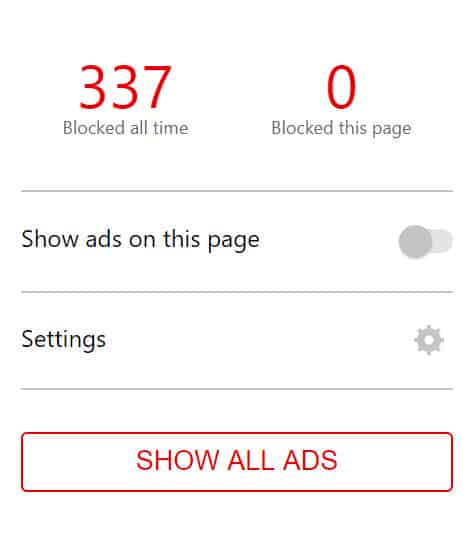
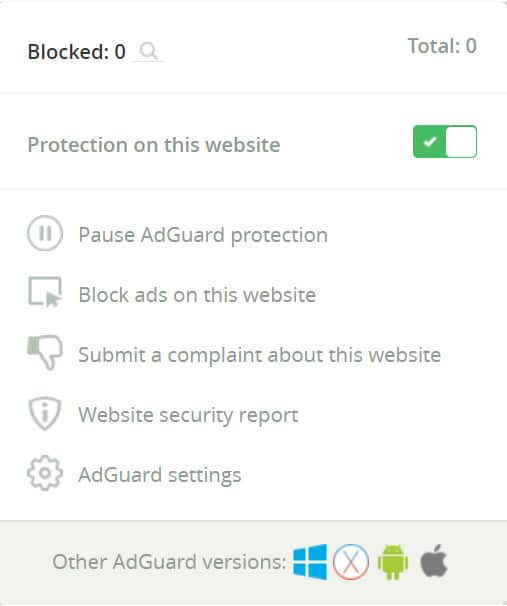

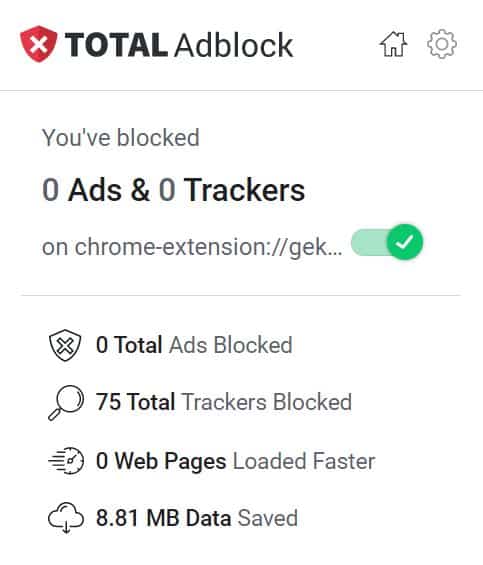
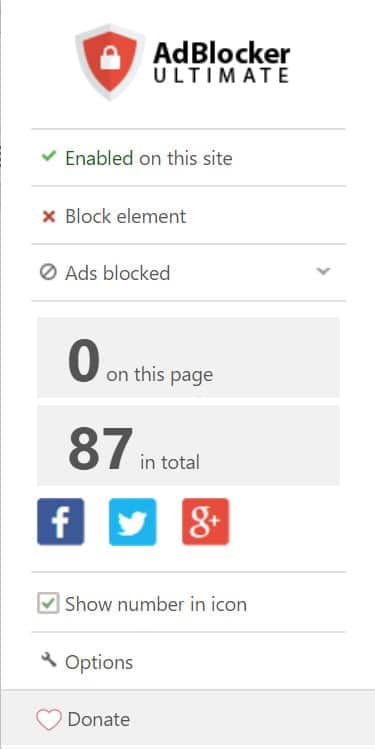
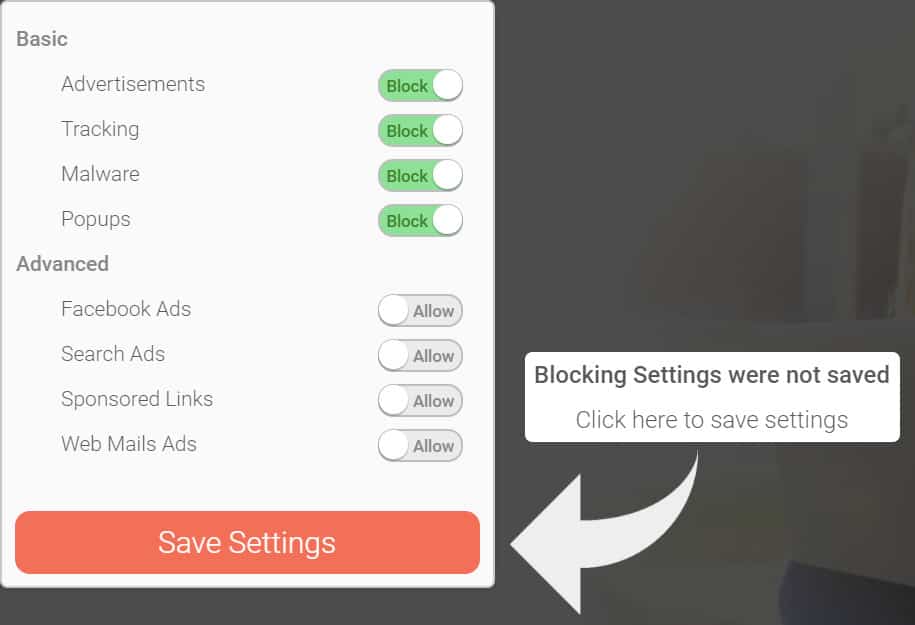
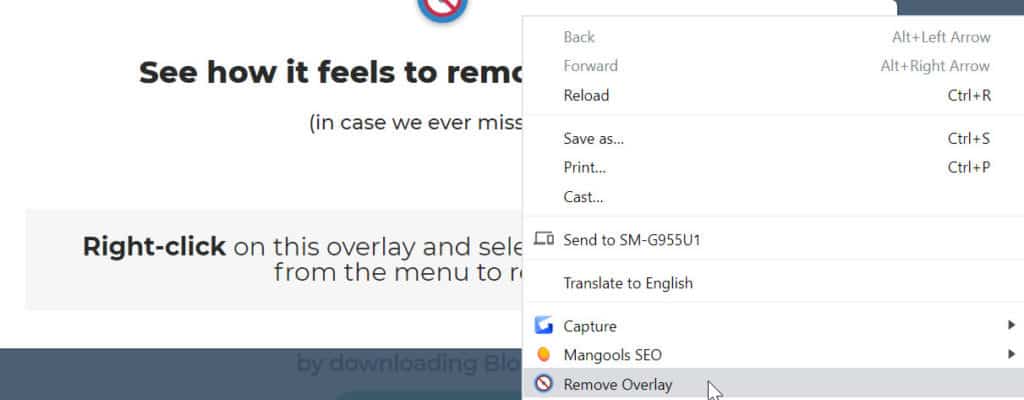
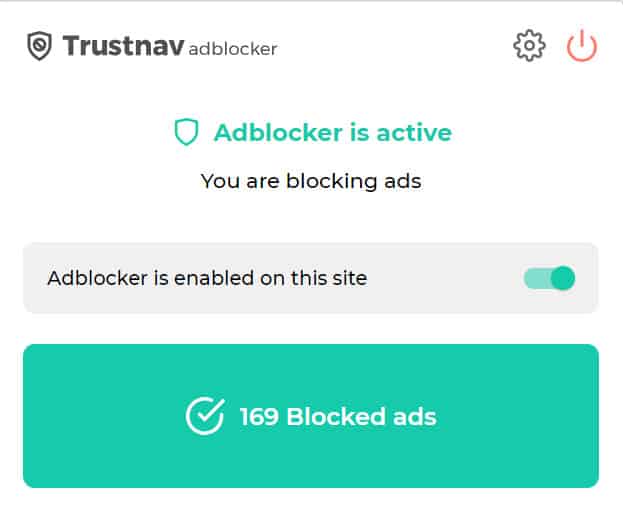

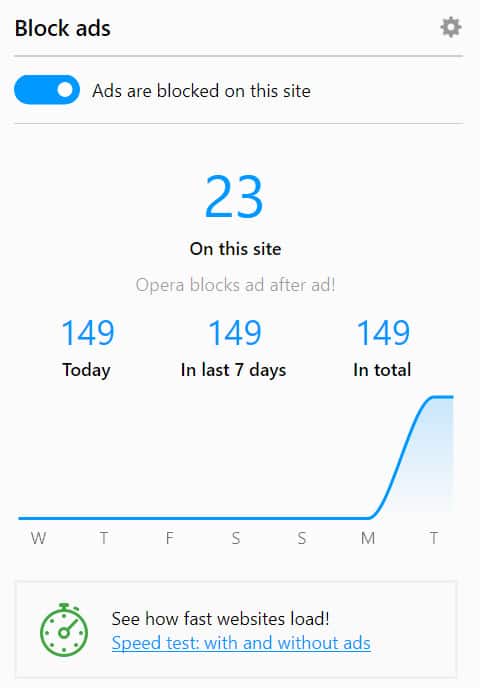








You really help me. I don’t experience anymore popups.
Thanks
I used AdBlock Plus, which wasn’t bad, but once you blocked something, you couldn’t unblock just that one thing. Missing from your evaluation was the ability to customize the tool. I suppose Adblock Plus can be customized by altering the source code, but it should be easier than that.
Good and useful observation. We’ll take that aspect into consideration when we slate this one for an update. We like to keep these updated several times a year as the environment and products change frequently. I’d mark that up to a usability issue, certainly, which we may place as a new rating criteria.
I am running Windows 10 and would like to know which add blocker to use thats free like OPERA on my laptop computer. I currently have Windows 20 / Firefox / loaded as search engines. Is OPERA another search engine? Tired of so many adds popping up. Thanks for your time.
Privacy Badger….
Hi PPatrick!
WE actually mentioned Privacy Badger and Ghostery at the end of the article, to explain why we didn’t include them in the list. You can find it using the table of contents on the page, but we stated the following:
“You may have heard of the popular ad blockers Privacy Badger and Ghostery. While we like and respect these two ad blockers, neither met our criteria based on how they function. Neither of these plugins is designed to block ads, specifically, but to deny website ads and other website elements that betray user privacy. As a result, both will block some ads some of the time but are primarily focused on privacy instead of complete security online.”
The proliferation of internet advertising has turned the promise of the “information superhighway” into the reality of the marketing mudpath. I have used AdBlock Plus with Firefox for many years and find it simple and reliable, i just wish it could be made “stealthy” so sites could not detect its use. Am considering trying ublock as I’ve read it can also block those irritating “sign up for our newsletter” or “like us on Farcebook” popups that virtually prevent you from reading what you visited the site for (and also allegedly will remove those heinous “sign up or login to continue” blocks in pinterest and instagram). I’ve been using the Brave browser, with built in ad blocking and tracker blocking, for several months now; it seems to work at least as well as AdBlock but wonder if you’ve tested/compared it.
Hi jgj!
I definitely second your use of Brave Browser. Highly reputable, highly effective.
I need help. Firstly, I’m 81-year-old. Not savvy about “blockers”… I’m using a new computer; my old one was about 10-15 years old and I loved it.. but, it began to have problems… my son bought me this new-fangled item, in which I feel like Alice… in Wonderland. Ad-blockers … new word for me… but, I kinda get the picture why they can be necessary. BUT, which can I trust and eventually buy. My messages on this new ‘puter tells me I’ve two days before my trial expires.
Any and all advise is appreciated.
Sorry! Sam Cook—not Tom Cook!
Hi Thelma,
I agree with Tom Cook that AdGuard and AdBlock Plus are two choices, but one word of warning on AdGuard’s Technical Support: it’s Bad! I have used the free version of AdGuard for a few years, and even though it blocks a lot of ads for my iPhones, I still have problems with some pop up banners, and the most annoying ad to me is the auto play videos that prevent me from watching the weather related news before I finish watching these videos!
I asked AdGuard for help, with these issues and the issue with email junks from certain sites with a suffix of @conservazon.net. At first, it asked me to do this and that, replied to me a few times, and the completely ignored my existing issues! To me, such attitude is totally Unprofessional And it implies AdGuard is too money-driven to care much of its consumers, unless you PAY! If you use the free version, you are nothing but by passers! They seem to forget that the first impression is important, and a lot of the by passers using the free version are their future subscribers!
AdGuard (free version) also excludes important features like “Security” and “Custom” unless you opt for the paid version!
I used AdBlock Plus before on my PC, and my wife has been using it for her iPhone. Now I come back to add AdBlock Plus to my iPhone to eliminate the ads that AdGuard fails to block as mentioned above.
Just install Adblocker Plus and uBlock Origin, which are free. You should never pay for something you can get for free.
I find with these tend to work unless you run into the occasional website that flags you and demands that you unblock them.
Hi Thelma!
If you’re looking for something good and reliable, AdGuard or AdBlock Plus (mentioned higher up in the article) are probably safe bets.
Hey Sam,I hope you know something I don’t. Ad Guard was highly recommended to me. I specifically downloaded “Free Ad Guard for Windows 10” and was very pleased with the results,but I eventually got a pop-up informing me that my trial period had expired. At the suggestion of an Ad Guard tech,I uninstalled what I had.Then I downloaded the Firefox extender,I use the Firefox browser,and again downloaded the “Free Ad Guard for Windows 10”.I got perhaps two weeks of very good Ad Guard service before I once again received the pop-up notice informing me that my trial period expired yesterday,Dec.6th ’19. Does Ad Guard really offer a permanent “free version” or only free trial periods before requiring a purchase?
Hi Mark!
Thanks for chiming in here. This is a post we regularly update (and we just did an update this week to remove some blockers that don’t work anymore and add a new one). It appears since we first added Adblock to the list, they got rid of their free version! That’s probably the discrepancy. Their website contains some language still about free versions, but that’s clearly not the case anymore since it’s now a 2-week free trial instead of a free and premium option.
Thanks Sam,I guess I will scan your list for what seems best for me.Thanks for your reply
Ads should be illegal
I thought AdLock or AdGuard were always free. After a month or so they refuse to work unless I pay. That seems unfair. Isn’t there an always-free ad blocker for MS Edge?
Adlock is only free forever if you use for as a Chrome extension. Same with AdGuard. If you want to use them both outside of an extension, you’ll need to purchase them.
Edge does have a built-in ad blocker, but as with the other built-in ad-blockers, it’s only marginally effective. Edge’s is better than Chrome’s, I will say, and I think Google is not nearly as incentivized to help block ads given Adsense is a big part of its revenue generation.
Hi there,
Just FYI, after discovering today that my Safari pages are suddenly riddled with ads and that my old ad blocker has apparently disappeared from my computer, I went looking for new ad blocking reviews and found your excellent article. (Thank you!) I then opened another page that I had tabbed but hadn’t looked at until after I’d seen yours and instantly realized that it had been “borrowed” in full and verbatim from your article (only omitting the intro paragraph on the Comparitech page) but without attribution. It was dated the day after yours was. Maybe they had your permission – or maybe you borrowed from them, or both of you from elsewhere? – but if not see
sritutorials. com/ 10-best-free-ad-blockers-to-remove-ads-popups-for-2019/
Sorry for the bother if you already know this,
Jen
(Please make sure my email address does NOT end up on a mailing list, after any one-off reply you may care to send if you do that.)
Thanks a lot for bringing this to our attention Jen! We’re going to look into this. This kind of thing is not uncommon, but getting it taken down can be a headache sometimes. To note, our piece is actually much older than a few months and we keep it regularly updated with relevant info.
(And don’t worry — we don’t put commenters on mailing lists!)
i LOVED Incognito Adblocker, but seems the link is dead on Firefox’s addon search. Did something happen to it? It was everything I wanted, giving me the right to ok certain pictures or web site elements as desired so sorted like starting with a blank page and only allowing in the real things you want to read and see. Kinda reverse of blocking an element. I’ve found that far less labor intensive and I get EXACTLY the content I want.
And yes … I white list my most traveled to sites. :-}
if anyone finds a legit link for Incognito Adblocker, please please please let me know? I saw on the comments when i got it for my other laptop that someone was accusing him of ripping off an original other adblocker, but honestly? the interface ROCKS. So simply to understand without taking away every tool you’d want – including ultra privacy. Yummmmm
tari ~~~ TYTYTY
Hi Tari,
The website shows this one is still available.
https://www.incognitoadblocker.com/
If you click on the link to go to the chrome store it ends up being a 404 error link and cannot find the app at the google chrome store.
Hi D!
Can you point me to which one was giving you a 404? I tried all of the Chrome Store links and I didn’t get 404s through any of them, but I’m keen to fix any of the links if there’s a broken one.
does anyone know of a chrome os blocking software comparable to adguard pro for ios? adblock plus is the best ive found and it is lacking in user capability significantly. any direction appreciated
I have been looking for a better ad blocker and trying different ones because what I consider to be “acceptable” ads and what Google, Mozilla, etc. consider to be “acceptable” are usually very different. And some of the ad blockers are hard to work around with my Ebates addon and Trend Micro Subscription addons.
Thanks for all of the helpful info here!! I appreciate it!!
In case you want to update the info, AdBlock/AdBlocker Ultimate for Chrome was updated on October 25, 2018. And it was just updated for Firefox today, December 25, 2018. Merry Christmas to All!!
Does anyone know what happened to Fair Adblocker by Stands? It’s not working anymore and it’s not on Google Web Store.
Hi Ash,
As far as I can tell, this one still exists:
https://chrome.google.com/webstore/detail/fair-adblocker/lgblnfidahcdcjddiepkckcfdhpknnjh?hl=en-US
I have it, just installed it, do a search as I did ?
For me it’s fire money to buy an adblocker. I’m using Trustnav Adblocker because it’s free and unlimited, in the other side it’s very simple and not very intrusive when you’re on the net. I’ve tested others but just the trial version.
did ad blocker work.
Thanks for the comment, Carol! Trustnav is a solid ad blocker, good choice!
Using Ad Blocker extension in Chrome, having difficulty opening some files, mails, Pinterest etc., I turned Ad Blocker off, seems to be much better now.
Hi Ron,
Some ad blockers will block suspicious links and different windows that popup that may share commonalities with the code used for ads. Your best options are either to whitelist some of the sites you don’t want that blocking to occur, or try a different ad blocker if the one you’re using is too aggressive.
Is it possible to test these on sites like Kissanime where you get banned if they find you have an ad-blocker on your comp? There are a lot of people that get so fed-up with this. Even if you have it switched off, you still get banned.
Hi Theresa,
I don’t personally use Kissanime or similar sites, but I took a look at it. From what I can tell, you don’t need to create an account or login to Kissanime or sites like it. I’d definitely recommend not signing up for these sites as they aren’t particularly trustworthy with user information.
Assuming they can still block and ban people who aren’t logged into the site for using adblockers, my guess is they’re simply identifying users by their IP address. If that’s the case, I recommend signing up to and using a VPN when connected to their site.
does these ad blocker work and not open up more ads on your computer screen
Hi Will,
These pop-up blockers passed out test regarding that. None of them should open more ads.
Is there an extension to block floating videos in Chrome?
Hi Ziggy! This Chrome extension might help:
https://chrome.google.com/webstore/detail/turn-off-the-lights/bfbmjmiodbnnpllbbbfblcplfjjepjdn
the new one Smartadblock is a killer
-kills cookie notifications
-undetected
-kills popups on streaming websites
Trustnav is an antivirus company from Andorra that provides a combination adblocker and antivirus Google Chrome plugin. The antivirus solution, which is premium and costs $1.99 per month, is currently unavailable. For now, you can use the solo adblocker plugin for free.
Trustnav also currently has a “Safesearch” Chrome and Firefox plugin that’s separate from the adblocker. Be sure to install the adblocker version directly from the Chrome or Firefox.
As far as functionality goes, Trustnav presents a very easy-to-use adblocker with a great user interface. It’s simple and effective at most things. However, the biggest problem you’ll find with this adblocker is that you can’t adjust many settings.
It’s really interesting and useful adblockers but I’ve already tried the most of this and did not find one which can block every ads! Now, I’m using AdLock and you know I think it’s the best adbloker because I’ve not had any ads)) I recommend it!
I’m using it adlock.com It’s not bad
Thanks for the recommendation! We actually plan to update this piece in the near future as there are some great new options on the market.
adblocker ultimate is the best
Tried Trustnav and works very effectively also on popups, this was a surprise because the other adblockers I tried did not block popups..
Thanks for your article
Which adblockers don’t slow your computer down?
Hi Sev!
All of the options mentioned above are very resource lite, especially the ones that are browser extensions. If anything, your browser by itself is going to be pretty resource intensive on an older machine, and if you have a lot of windows open or multiple sessions of the same browser open, your computer could easily slow down. Chrome is a known resource hog, especially, so I would recommend an adblocker running on either Opera or Firefox.
I installed AdGuard AdBlocker and it is not free, it is trial version that expires unless you subscribe and pay a fee.
Thanks for letting me know! I’ll take another look at that one.
This list is outdated already. Much better ad blockers came out this year check Incognito Adblocker for firefox, it’s really good
Apps keep changing so fast! I’ll take a look at that one and update our list appropriately if it meets the criteria. Thanks!
Where is Popup Blocker Ultimate for firefox?
I will try Stand Fair , AdGuard AdBlocker and take a look at Ad Blocker Plus
just for my own test experience.
Thanks , this is a real world need ! ads are making the web unpleasant,even
though we will still use it out of habit and convenience.
Agee